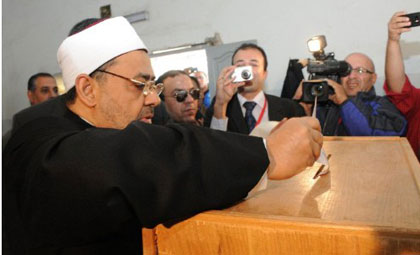
Managing Director at Mansour Foundation
(Photo courtesy of Egypt CSR Forum website )
Mansour Foundation for Development (MFD), a subsidiary of Mansour Group, undertakes many activities to promote the welfare and socio-economic development of Egyptian society, according to Rania Hamoud, Managing Director at MFD.
Daily News spoke to Hamoud about Mansour Group’s CSR activities.
What are the CSR Projects or activities you provide?
Mansour Foundation is highly dedicated to philanthropy. MFD deploys a variety of methods to eradicate illiteracy, poverty, disease and shaping the public awareness of good citizens.
Our strategic focuses on high priority areas in the fields of human development: education, health, capacity building.
After the revolution, we contributed to change through academic research, arts, culture, human relief, social entrepreneurship.
We have also identified four priority segments that we want to focus on: youth, women, children and inhabitants of remote areas.
We aim to upgrade public educational facilities and buildings, support poor and unable students and provide educational scholarships at home and abroad, in addition to preventing girls from dropping out of schools and combating illiteracy, and providing educational, technical, and economic support to marginalised sectors and supporting people with special needs in the field of sports.
Our approach is simply integration, inclusion and youth engagement; and our pillars are passion, purpose and people.
What’s the amount of money spent in these projects?
Mansour’s contribution to the development sector exceeds EGP 100m.
What are the successes and the outcomes?
At the core, the foundation cannot fulfil its goals without adopting standard policies and procedures that ensure the delivery of utmost quality and trustworthiness throughout the lifecycle of the projects that it engages in. MFD’s approach is highly biased, with a strong spirit to developing the human element in society, and is therefore based on community-driven projects. The foundation seeks not only to apply Mansour’s business management model in its community development activities, but also to transfer them to our recipients. The number of beneficiaries is 500,000 persons, the number of projects is 75 various projects, both national and regional. The number of governorates served is 10 and the number of partners is 100 partners.
How do you monitor and follow-up on these projects?
MFD wants to excel in particular in transferring management know-how to other civil society partners. Being involved, we implement a participatory approach and engage our stakeholders in every stage in the planning, execution and evaluation of activities in order to maximise project outputs. Our monitor system is based on interim technical and financial reporting, site visits, beneficiaries’ questionnaires, cost-benefit analysis, impact assessment, and final auditing.
Under the CSR Charter, Mansour Group is engaged in various activities. To facilitate measuring and monitoring these activities, we have introduced many globally accepted CSR guidelines, such as the UN Global Compact: principles of transparency, implementation of external monitoring and to proactively implement partnerships – or at least some form of engagement – with civil society. As well, the Global Reporting Initiative (GRI) is a standard set of monitoring and reporting processes and indicators.
That is what sets us apart from other traditional donors—as we believe that our role must extend beyond awarding grants.
Is the CSR funding excluded from the company tax or not?
Having asked so, the different companies that belong to Mansour Group also engage on a number of independent society-related activities in their local communities through their CSR departments, which is funded by the corporate and deducted from the corporate tax according to the law.
Mansour Foundation for Development is non-profit grant-making organisation solely funded by the Mansour family, and does not fundraise or seek financial aid, neither internally nor externally. It is a legally-separate identity that manages the development activities and technically supports CSR departments. In this manner, it tries to centralise the society-related efforts of all our companies in order to maximise their output. Mansour is paying back gratitude to the Egyptian people and expects no returns in the sense of tax reduction.


